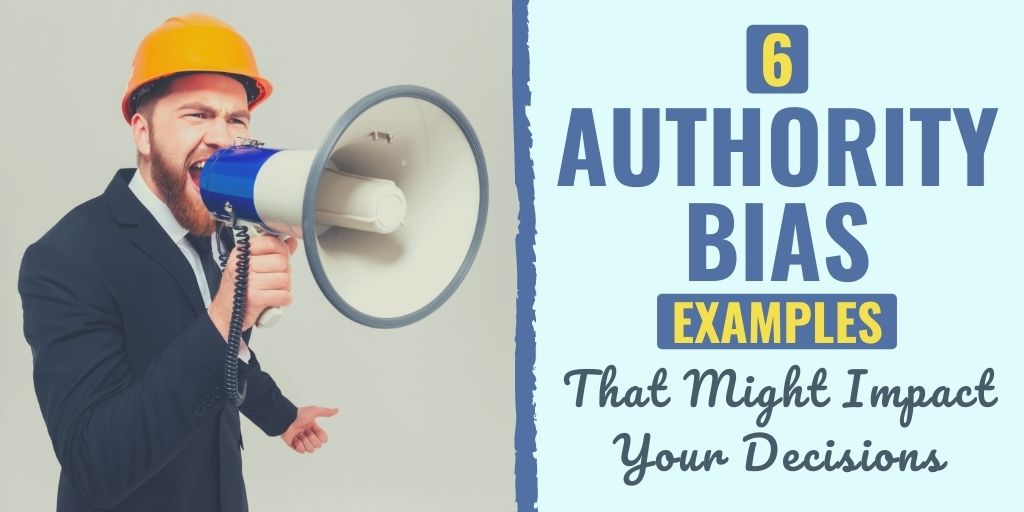It starts as children when we try to please and impress our parents. That need to please follows us to school as we try to impress our teachers and coaches–and ultimately to our adult lives as we go out of our way to please our bosses.
And this isn’t only true for people who tend to be people pleasers–everyone seeks approval from superiors. Probably because that’s one surefire difference between success and failure. If your boss thinks you’re worthless, you’re probably not going to climb up the corporate ladder at your organization. Furthermore, you likely won’t leave with a stellar recommendation letter in hand.
What most of us don’t realize is just how much this desire to please authority figures impacts our judgement when it comes time to make a decision. This tendency is called the authority bias, and it’s important to understand because it can impact your decision-making process. Just like other cognitive biases, authority bias is a mental shortcut that people take that often clouds rational thinking.
So in this article, we will look at six examples of authority bias and how this cognitive tendency can influence your decisions. But first, let’s take a more comprehensive look at the definition of the authority bias.
What Is Authority Bias?
Authority bias refers to the inclination we have to follow the instructions of an authority figure without questioning their goals or methods. And this makes sense, as we are taught to “follow the leader” and go along with the decisions that people who are in authority have made.
But what has resulted is a profound sense of obligation to comply with authority–whether that’s a boss, a CEO, or a highly-respected expert of some sort. Authority bias is rooted in underlying social norms, which means people often mindlessly and blindly accept the opinions of authorities rather than thinking for themselves.
Centuries ago, following the leader who was making all of the decisions was helpful for people. Knowledge and information were limited, so people wanted to follow those who knew more than they did. But in our advanced world, everyone has access to information and a formal education to help in making their own choices, so blindly accepting a statement from an authority figure is not always sensical anymore. You now have to use your own judgement to guide your behavior and decisions.
The authority bias cannot be fully understood without noting the infamous Milgram Obedience Experiment, a 1961 study of authority bias by a psychology professor at Yale. Stanley Milgram set out to examine people’s inclination to obey an authority’s orders, even if they think there’s something wrong with the orders, and even if there would be no penalty for opposing them. His focus was on people’s internal conflict between their conscience and their inclination to obey authority.
In the experiment, participants (“teachers”) were told to administer painful electric shocks to another person (“learners”). Many (65%) of the teachers complied, even after expressing they wanted to stop, because they felt pressure from the leader of the experiment (“experimenter”) who would tell them the study would be ruined if they didn’t follow the rules.
The Milgram experiment illustrates an extreme example of the potential effects of authority bias, but this phenomenon can play a role in your everyday decision-making. As with other cognitive biases, such as confirmation bias and the halo effect bias, authority bias is an underestimated phenomenon that our brains are vulnerable to.
So, why does this happen? Cognitive behavioral research has shown that our decisions are driven by two interconnected systems in our brain. “System 1” controls thinking processes that are unconscious and automatic, and “System 2” controls our more deliberate thoughts and executive functioning, which is filtered through our consciousness, motivations, and experiences. Most of our decisions take place at the system 1 level. Cognition and decisions may be further compromised by external factors such as social or organizational pressure, uncertainty, high work-load, stress, and complexity.
But you will be less likely to be influenced by this cognitive bias if you’re aware of it. Remember, authority figures can make poor decisions just as well as anyone else–and in these cases, if you follow a mistake without second guessing it, it can lead to poor outcomes that negatively impact you.
Let’s take a look at some examples of this.
6 Authority Bias Examples That Might Impact Your Decisions
1. In Educational Settings
Let’s start at the beginning: a lot of things that you probably learned in school are simply not true. From Christopher Columbus sailing the ocean blue in 1492 to discover America to Thomas Edison discovering light bulbs, there are a lot of things that are simplified and taught to children in school from the authority of teachers that are actually false.
While this skewed information may not have led you to make any harmful decisions, it is an example of how you were programmed at a young age to accept information coming from an authority of some sort.
It may not be until you start questioning these early “truths” that you can truly question what authorities say moving forward.
2. In Advertising
From toothpaste ads to cigarette campaigns, companies who are trying to sell a product often stick an authority figure in their ads in some way so consumers can get the recommendation from someone they know they’re supposed to trust.
Think back to this Dell commercial featuring Sheldon from The Big Bang Theory. This was an effective sales tactic because people believe that Sheldon Cooper, as a genius physicist, is an authority on computers.
But, if you’re thinking logically, is this fictional character really an authority on laptops? Maybe in the show creator’s mind. But Jim Parsons is an actor.
But advertising agencies know that most people won’t take the time to think about how ridiculous it is to follow this recommendation because they’ve fallen for the automatic reaction of authority bias.
3. In Medicine
How many times have you been prescribed a medication by your physician, filled the prescription, and taken it as directed? Probably a lot.
You likely don’t take the time to do your own research on every drug you’re prescribed to make sure that you think it’s the best option for you. You trust your doctor as an authority figure, so you follow his or her instructions.
While using advice from an expert in the field is a valuable shortcut that is usually fine and saves us time, once the acceptance of the authority’s determination becomes an automatic response, it can be troublesome.
People have certainly faced issues after taking a wrong medicine, agreeing to have unnecessary medical procedures, and receiving incorrect diagnoses. Getting a second opinion can be valuable.
4. In Business
Authority bias has an impact in business through what is referred to as HiPPOs. This stands for Highest Paid Person’s Opinion, which means decisions in business are often based upon the opinion of a senior staff member, which people in lower level pay grades often concede to. In other words, we often overlook the details of an issue to conform with the most senior person involved.
Studies have found that projects that have junior managers at the helm tend to have higher success rates than those led by senior managers. This may be because team members are more comfortable challenging assumptions and offering feedback in projects that are led by leaders who are closer to their own professional level, and these opinions improve the end result. When working alongside senior managers, junior staff often holds back from voicing their valuable opinions, and projects are more single-minded.
5. In Politics
Consider the outcome when famous figures (actors, sports players, or well-known millionaires) run for office. These people who are looked up to by many may have little or no experience in politics, but often win when they’re a political candidate.
People see these authority figures as being successful in their lives and apply that success to how this person could perform while in office.

This also happens in politics when celebrities come out with endorsing a specific candidate. Celebrities are often featured in political ad campaigns and many use their platform to speak publicly about a candidate or an issue that they support. Celebrities use their influence to attempt to persuade citizens to think or vote in a particular way or advocate for specific issues.
6. In Your Life
Do you review the pros and cons of your bosses instructions? What if she is making a decision that is obviously wrong, but no one is speaking up?
If your boss is a good leader, she will remind your team to not blindly follow her, but to offer their input and ask questions. A leader’s team should be clear on the leader’s motives and intentions, and counter her arguments when necessary.
Speaking of intentions, this also applies to areas of your life that are full of uncertainty. It’s important to scrutinize an expert’s advice, especially when the outcome impacts that person directly. There’s a reason why your wealth manager has a yacht to go out on over the weekend, but many of her customers don’t.
With the presence of so many domineering leaders out there, we are still far away from this being the norm, but thinking in these terms in your everyday decisions can bring us a step closer.
How to Avoid Authority Bias
Whenever you’re following an instruction, consider whether or not you’re doing the right thing. If not, speak up. After all, you have the ability to prevent a disaster.
Don’t assume that whatever your boss believes is more valuable than your thoughts. Leaders are in place to ensure groups can work together towards a common goal, but they’re not there to dictate how that always happens.
When decisions have a major impact, ask questions or get another opinion. When your boss appoints you to do a pointless task, tell him why you would be wasting valuable company time doing it and suggest another way. When your money manager tells you to buy a certain stock, ask him why.
If the person is confident in their original request, they will have facts to back up their reasoning. And, these additional facts can help you make a more informed decision.
Final Thoughts on Authority Bias
Not everyone in authority always makes the right choices. Sometimes leaders have an inflated ego that can lead to a poor outcome. Other leaders expect their team to speak up. Either way, people refrain from speaking because they assume they can’t challenge authority.
Think through your decisions before taking action. And if you have a valid point, bring it up. Hopefully these examples of authority bias have helped you understand how this cognitive bias works so you can avoid thinking in its terms in the future.
Learn More About Logical Fallacies
- 5 Appeal to Nature Fallacy Examples in Media and Life
- 6 Outcome Bias Examples That Can Negatively Impact Your Decisions
- 7 Self-Serving Bias Examples You See Throughout Life
- 7 Omission Bias Examples That Negatively Impact Your Life
- 5 Burden of Proof Fallacy Examples
- 5 Appeal to Tradition Fallacy Examples in Life
- 5 Appeal to Authority Logical Fallacy Examples
- 7 False Cause Fallacy Examples
- 7 Appeal to Ignorance Fallacy Examples
- 7 Appeal to Common Sense Logical Fallacy Examples
- 5 Post Hoc Fallacy Examples (and How to Respond to This Argument)
- Gambler’s Fallacy: 5 Examples and How to Avoid It
- 5 Appeal to Anger Fallacy Examples Throughout Life
- 7 Poisoning the Well Examples Throughout Your Life
- 7 Survivorship Bias Examples You See in the Real World
- 7 Dunning Kruger Effect Examples in Your Life
- 7 Either Or (“False Dilemma”) Fallacy Examples in Real Life
- 5 Cui Bono Fallacy Examples to Find Out “Who Will Benefit”
- 6 Anchoring Bias Examples That Impact Your Decisions
- 7 Virtue Signaling Examples in Everyday Life
- 7 Cherry Picking Fallacy Examples for When People Ignore Evidence
- 9 Circular Reasoning Examples (or “Begging the Question”) in Everyday Life
- 9 Appeal to Emotion Logical Fallacy Examples
- 9 Appeal to Pity Fallacy (“Ad Misericordiam”) Examples in Everyday Life
- 9 Loaded Question Fallacy Examples in Life and Media
- 9 Confirmation Bias Fallacy Examples In Everyday Life
- 9 Bandwagon Fallacy Examples to Prevent Poor Decisions
- 5 Red Herring Fallacy Examples to Fight Irrelevant Information
- 9 Middle Ground Fallacy Examples to Spot During an Argument
- 5 False Equivalence Examples to Know Before Your Next Argument
- 7 Hasty Generalization Fallacy Examples & How to Respond to Them
- 6 Straw Man Fallacy Examples & How You Can Respond
- 6 False Dichotomy Examples & How to Counter Them
- 7 Slippery Slope Fallacy Examples (And How to Counter Them)
- What is the Planning Fallacy?
- How to Overcome the “Sunk Cost Fallacy” Mindset
Finally, if you want a simple process to counter the logical fallacies and cognitive biases you encounter in life, then follow this 7-step process to develop the critical thinking skills habit.

Connie Mathers is a professional editor and freelance writer. She holds a Bachelor's Degree in Marketing and a Master’s Degree in Social Work. When she is not writing, Connie is either spending time with her daughter and two dogs, running, or working at her full-time job as a social worker in Richmond, VA.


